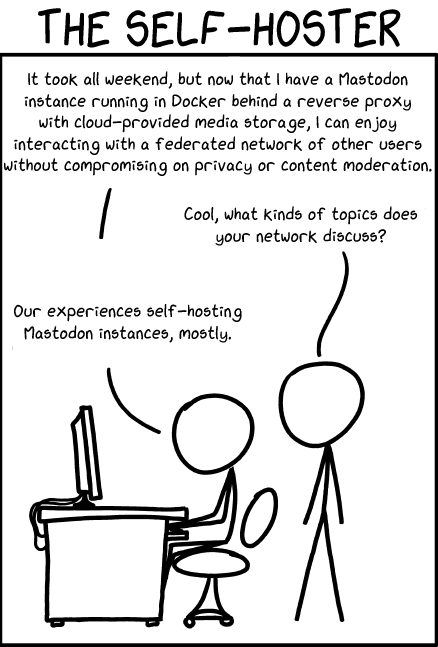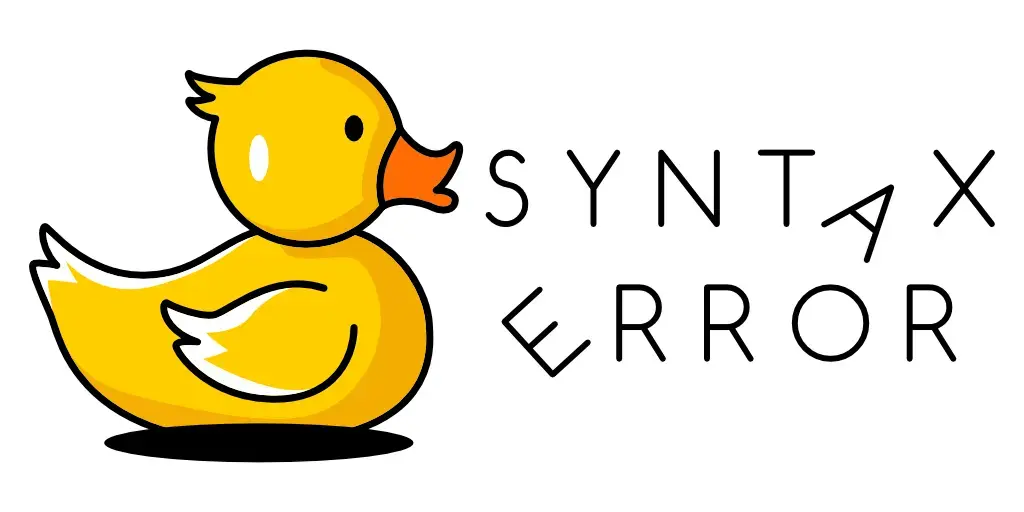
Data Science
- 15 Posts
- 166 Comments


Nice article.
why bother? Why I self host
Most of this article is not purely about that question, but I dislike clickbait, so I’ll actually answer the question from the title: Two reasons.
First of all, I like to be independent - or at least, as much as I can. Same reason we have backup power, why I know how to bake bread, preserve food, and generally LARP as a grandmother desperate to feed her 12 grandchildren until they are no longer capable of self propelled movement. It makes me reasonably independent of whatever evil scheme your local $MEGA_CORP is up to these days (hint: it’s probably a subscription).
It’s basically the Linux and Firefox argument - competition is good, and freedom is too.
If that’s too abstract for you, and what this article is really about, is the fact that it teaches you a lot and that is a truth I hold to be self-evident: Learning things is good & useful.
Turns out, forcing yourself to either do something you don’t do every day, or to get better at something you do occasionally, or to simply learn something that sounds fun makes you better at it. Wild concept, I know.
Contents
Introduction
My Services
Why I self host
Reasoning about complex systems
Things that broke in the last 6 months
Things I learned (or recalled) in the last 6 months
- You can self host VS Code
- UPS batteries die silently and quicker than you think
- Redundant DNS is good DNS
- Raspberry PIs run ARN, Proxmox does not
- zfs + Proxmox eat memmory and will OOM kill your VMS
- The mystery of random crashes (Is it hardware? It’s always hardware.)
- SNMP(v3) is still cool
- Don’t trust your VPS vendor
- Gotta go fast
- CIFS is still not fast
- Blob storage, blob fish, and file systems: It’s all “meh”
- CrowdSec
Conclusion
Mp3 is a proprietary format on copyright. Some idiot ceo can came and change the rules, let’s add an ads mandatory for each decoder.
This is not true. Copyright is not relevant to an encoding standard. The standard has been unchanged for 26 years and all legal claims of patent rights related to implimentations of the standard have expired before May 2017.
@swooosh@lemmy.world you should probably know about this as well.


I’m very confused about what your requirements are based on reading your post and some of your responses to comments, but I’m going to suggest that you look into Quarto


Oh. I was thinking opensource and the organizations above that pay for Discourse to host for them a are non-profit. I don’t know why I read the post body and forgot about the title.
I guess programming.dev sorta fits except the UI is different. Maybe someone can create a frontend that mimics the Stack Overflow UI.


There are many Discourse forums for various programming related tools, services, and programming languages. I’ve shared 3 examples below.


You can use this as an opportunity to have a conversation about what it is about those movies that she likes. This could open up to a larger conversation where you can connect and grow your relationship as mother and child. Or she might just say something vague and simple and you can ignore the movies while they sit in a separate library.


I’m going to throw this out there not being sure how true it is, but I find it interesting to think about.
XMPP is much more widely used than Matrix if you count WhatsApp (Meta/Facebook). ActivityPub is much more widely used than AT Protocol and nostr combined if you count Threads (Meta/Facebook). So reasons why people aren’t talking about XMPP include not wanting to recognize that Meta is hugely influential in this space and that most people don’t talk about the underlying protocols of the services and tools they’re use at all leaving a self selected group of people looking for alternatives with traction that don’t depend on Meta. Outside of WhatsApp, there’s not a lot of traction with any particular XMPP implementation. And none of the XMPP implementations have a Discord-ish organization of chat rooms that’s popular and familiar right now. Matrix has both right now (although I don’t think it will ever be more than a small niche in the mobile messaging space).
I’m fine with using Matrix for what it is. There are programming language communities that have been very helpful for me and a number of Lemmy related communities that have been nice to be a part of.
Sign in with Google/Facebook/etc. bypasses the problem that ActivityPub isn’t all that popular (this may change with Threads but it’s unclear how that will play out). But I also think you’re overstating the hesitation most people have in creating an account for a service. Also, being a hobby project, it doesn’t necessarily need to be or desired to be popular right away. It doesn’t need to have all the features right away. It doesn’t have to be built in one try or architected perfectly.
Knowing nothing else about you or the new job offer, it makes sense to take the offer. But I’d rather know more than the information you’ve presented. The good news is that you do know more and can better determine if there are mitigating circumstances that make turning down the offer make more sense.


Whatever you’re not familiar in the digital textbook OCaml Programming: Correct + Efficient + Beautiful
There’s a whole chapter on modules
There’s also a section on Monads
You should also know that there is a schism in OCaml ecosystem created by the libraries developed by Jane Street and the those developed by INRIA.


Does Linkwarden fit your intended use?
It cuts both ways. Less commercial interest means only hobby level development (which can be high quality, but is typically slow and unpolished for users).
So you can spend your energy on making up the gap between the ease of use of the commercially supported software and the pure volunteer projects or you can have free time for things you’re more interested in and jump ship when they squeeze too hard for cash.

 English
English- •
- discuss.online
- •
- 1Y
- •

 English
English- •
- dev.to
- •
- 1Y
- •









There seems to be mixed reactions to this suggestion. I don’t know enough to understand why.